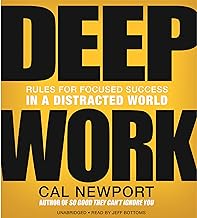Deep Work: A Strategy for Enhanced Innovation and Productivity in Engineering
Abstract
In the dynamic world of engineering and innovation, focus and sustained attention are essential for achieving breakthroughs. However, the constant barrage of distractions can significantly impede progress. This white paper explores the concept of "Deep Work" from Cal Newport's influential book, "Deep Work: Rules for Focused Success in a Distracted World." Deep Work refers to the ability to perform professional activities in a state of distraction-free concentration, enabling the production of high-value results.
This paper examines the benefits of Deep Work for engineers and innovators, outlines the core principles of the Deep Work philosophy, and suggests practical strategies for cultivating this valuable skill-set. By integrating Deep Work principles into their workflows, engineers can significantly enhance their creativity, productivity, and overall impact in the field of innovation.
Introduction
The engineering and innovation landscape is characterized by constant challenges, demanding problem-solving abilities, and the need for creative solutions. However, the ever-present distractions of the digital age threaten to derail focus and hinder progress. Cal Newport, in his book "Deep Work," introduces a compelling concept – Deep Work – as a solution to this pervasive issue. Deep Work emphasizes the importance of deliberate practice in a state of distraction-free concentration. This allows engineers to tackle complex problems, develop innovative solutions, and ultimately achieve groundbreaking results.
Benefits of Deep Work for Engineers and Innovators
Deep Work offers a multitude of benefits for engineers and innovators:
- Enhanced Creativity: Deep Work facilitates a state of flow, where individuals become fully absorbed in a task. This heightened state of focus fosters creative thinking and the generation of novel ideas. (Reference 1)
- Increased Problem-Solving Ability: When distractions are minimized, engineers can devote their full cognitive resources to tackling complex challenges. This leads to a more holistic approach to problem-solving and the development of innovative solutions.
- Improved Productivity: Deep Work sessions enable engineers to work with sustained focus, maximizing their output within a specific timeframe. This translates to increased productivity and faster completion of projects.
- Reduced Stress and Improved Well-being: By eliminating distractions and achieving meaningful progress through Deep Work, engineers can experience a sense of accomplishment and reduced stress, leading to greater well-being. (Reference 2)
Core Principles of Deep Work
Newport outlines two key principles for cultivating Deep Work:
- Deep Work Philosophy: This principle emphasizes the importance of intentionally scheduling uninterrupted blocks of time for focused work. It involves actively eliminating distractions and prioritizing tasks that require deep concentration.
- Rules for Deep Work: This principle provides actionable strategies for implementing Deep Work. These include techniques like batching similar tasks, setting clear goals for Deep Work sessions, and establishing a distraction-free work environment. (Reference 3)
Strategies for Cultivating Deep Work in Engineering
Several strategies can be adopted by engineers to cultivate Deep Work:
- Schedule Deep Work Sessions: Block out dedicated time slots in your calendar for Deep Work. Treat these sessions with the same importance as client meetings or deadlines.
- Identify Your Distractions: Recognize your personal triggers for distraction, such as social media notifications or email alerts. Implement strategies to minimize these distractions during Deep Work sessions, such as turning off notifications or using website blockers.
- Embrace Minimalism: Create a work environment conducive to Deep Work. This could include setting up a dedicated workspace free of clutter or utilizing noise-canceling headphones.
- Practice Mindfulness: Mindfulness techniques like meditation can enhance focus and improve your ability to enter a state of flow during Deep Work sessions. (Reference 4)
Conclusion
In today's fast-paced world, the ability to achieve Deep Work is a sought-after skill for engineers and innovators. By understanding the advantages of Deep Work, adopting its core principles, and implementing the suggested strategies, engineers can significantly enhance their creative problem-solving abilities, maximize their productivity, and drive groundbreaking advancements within the field of innovation. Cpontact ias-research.com for details.
References:
- Csikszentmihalyi, M. (1990). Flow: The Psychology of Optimal Experience. Harper Perennial Modern Classics.
- Mark, G., Gudith, D., & Klocke, U. (2018). The cost of interrupted work: More speed and stress. Proceedings of the 51st Hawaii International Conference on System Sciences, 1089-1098. doi: 10.24251/HICSS.2018.134
- Newport, C. (2016). Deep Work: Rules for Focused Success in a Distracted World. Grand Central Publishing.
- Langer, E. J. (1981). Mindfulness. Addison-Wesley.
Additional Resources:
- Website: Cal Newport's Blog



